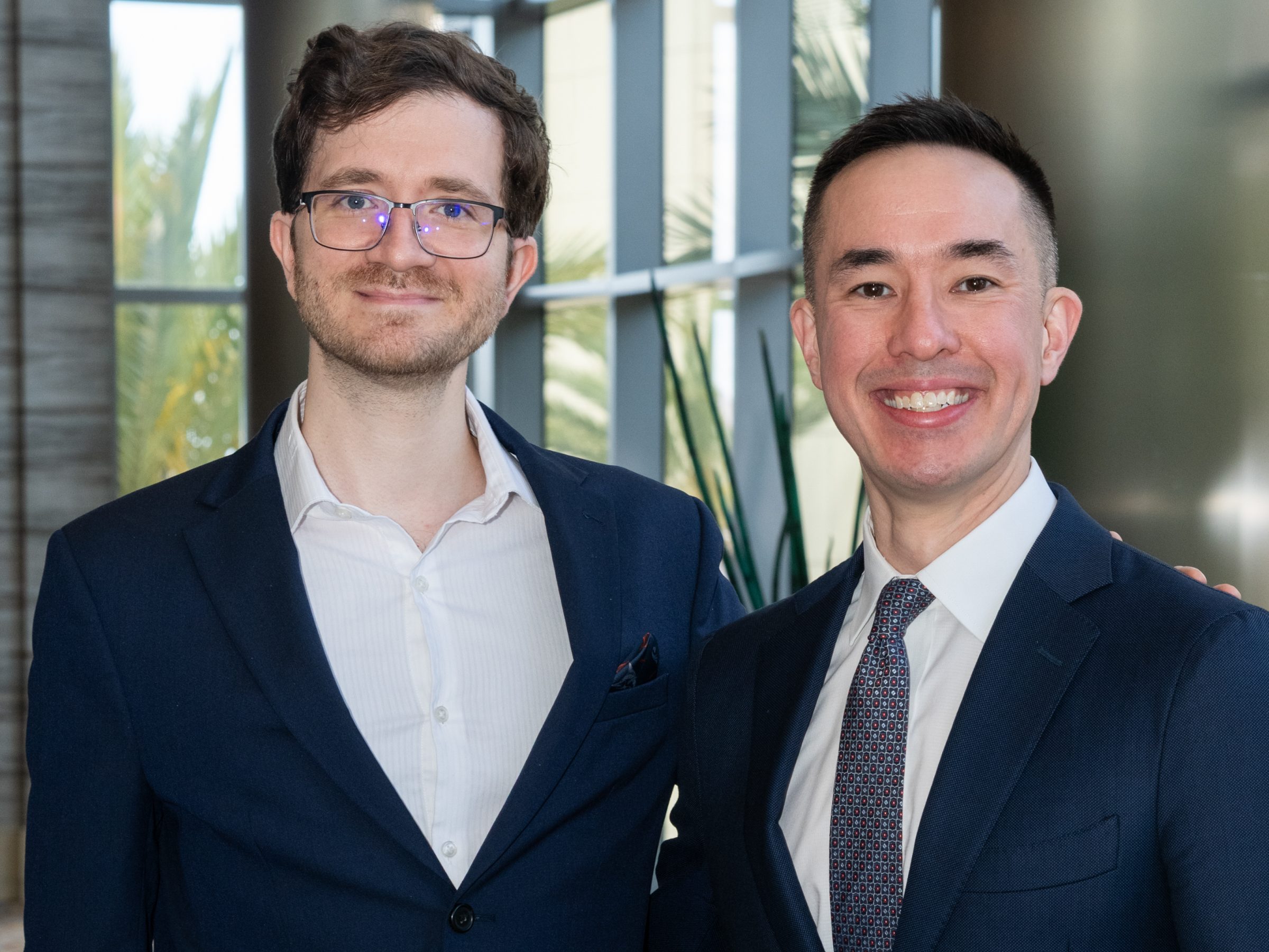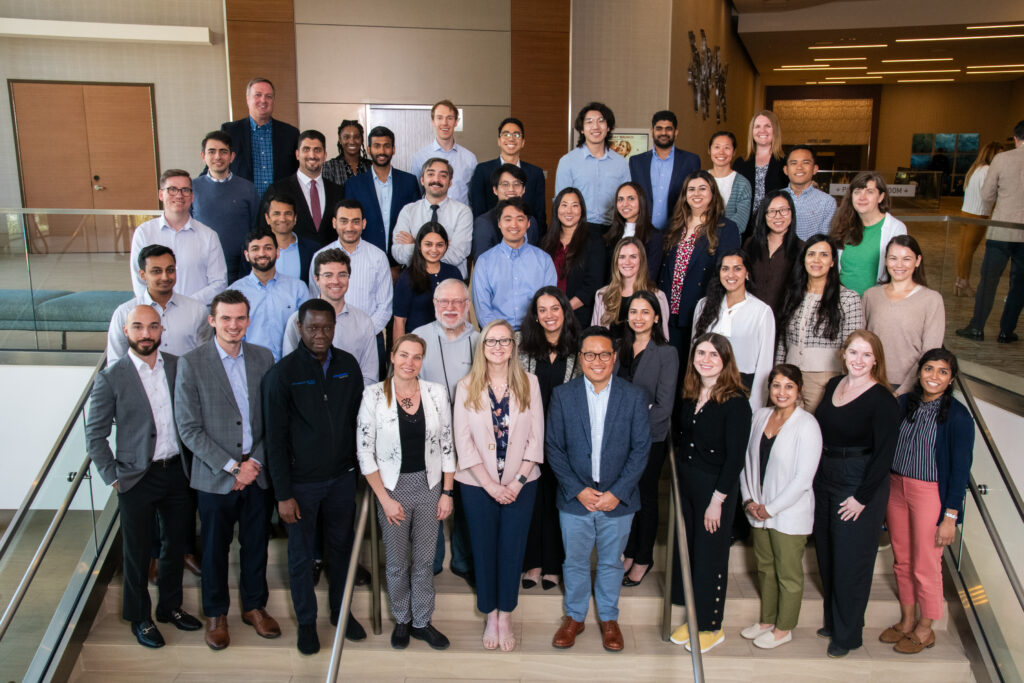
Matthew Lee and Luca Pasquini Receive 2025 ARRS Scholarships
The American Roentgen Ray Society (ARRS) is pleased to announce two 2025 ARRS Scholarships have been granted to Matthew Lee, MD, at the University of Wisconsin School of Medicine and Public Health and Yale School of Medicine’s Luca Pasquini, MD, PhD.
Provided by ARRS’ own The Roentgen Fund®, the ARRS Scholarship supports early-career faculty members pursuing radiological research that promises to change how medical imaging is practiced. A two-year grant totaling $180,000, the ARRS Scholarship aims to advance emerging scholars, as well as prepare them for positions of leadership.
Drs. Lee and Pasquini were formally recognized as recipients of the ARRS Scholarship during the opening ceremony of the 2025 ARRS Annual Meeting at Southern California’s Marriott Marquis San Diego Marina.
Matthew Lee, MD, is an assistant professor of radiology in the abdominal imaging and intervention section at the University of Wisconsin School of Medicine and Public Health. He completed his medical degree, surgical internship, and diagnostic radiology residency at the University of Wisconsin School of Medicine and Public Health. Following residency, Dr. Lee served as an active-duty diagnostic radiologist in the United States Navy. Returning to the University of Wisconsin for an abdominal imaging and intervention fellowship, in 2022, he joined the faculty. Dr. Lee’s research focuses on artificial intelligence (AI) applications in abdominal imaging, “opportunistic” imaging, body composition analysis, workflow optimization, and advancing radiology’s role in population health. Having published and presented extensively on these topics, Dr. Lee is particularly interested in applying novel AI tools to radiology datasets to gain insights into disease diagnosis, risk prediction, outcomes, and health disparities—while optimizing radiology resource utilization. Committed to expanding radiology’s impact on public and population health, he is passionate about leveraging large-scale imaging data to add value through enhanced prevention, improved patient outcomes, and reduced health care costs, particularly for preventable diseases.
Luca Pasquini, MD, PhD, earned his medical degree from the University of Florence in 2014, followed by a radiology residency and a PhD in neuroplasticity at La Sapienza University in Rome—completed in 2019 and 2023, respectively. During his early career in Italy, he held neuroradiology positions at La Sapienza University and Bambino Gesù Children’s Hospital in Rome. In the United States, Dr. Pasquini advanced his career at Memorial Sloan Kettering Cancer Center (MSKCC), where he served as a research associate in the fMRI laboratory. Subsequently, he completed a Fellowship in neuro-oncology imaging and a nuclear medicine residency at MSKCC from 2020-2024. Having published more than 50 papers in peer-reviewed journals, he is internationally recognized for his contributions to the understanding of brain plasticity, earning multiple prestigious awards from leading radiological societies. Currently, he serves as assistant professor in radiology and biomedical imaging at Yale School of Medicine and as a neuroradiologist at Yale New Haven Hospital in Connecticut.
Medical schools, affiliated hospitals, and clinical research institutions with training interests in diagnostic radiology, nuclear medicine, allied sciences, or other professions fundamental to imaging techniques are invited to submit one nomination for the 2026 ARRS Scholarships. For full details, please visit ARRS.org/Scholars.
ARRS Scholar Update: Steven Rothenberg
Steven Rothenberg, MD, is in the second year of his ARRS Scholarship program, investigating methods for mitigating the nocebo effect in diagnostic reporting of lumbar spine MRI. Currently, he is recruiting for his first prospective randomized controlled clinical trial: NCT06103474. Since receiving his ARRS Scholarship during the 2023 ARRS Annual Meeting in Honolulu, HI, Dr. Rothenberg has been awarded Most Prolific Inventor by the Herbert Institute for Innovation and Entrepreneurship and the Light Bulb Award from the University of Alabama at Birmingham’s radiology department. His submission of eight invention disclosures have led to three distinct patent applications and one notice of allowance (US20240257947A1) from the United States Patent and Trademark Office. Meanwhile, Dr. Rothenberg’s research findings have yielded five co-authored published articles, two related editorials, and two AJR Original Research manuscripts presently in press. As an ARRS Scholar, thus far, he has presented 19 scientific abstracts, earning a Certificate of Merit during the 2024 ARRS Annual Meeting in Boston, MA. Dr. Rothenberg continues to donate to The Roentgen Fund to give back in support of other early-stage faculty applying for future ARRS Scholarships.
30 Radiologists Receive Grants for Clinician Educator Development Program
ARRS proudly announces the latest recipients of our longrunning Clinician Educator Development Program (CEDP) for radiologists. The CEDP Class of 2025 includes the following 30 clinical educators of medical imaging, selected from a competitive field of applicants, who have collectively received more than $40,000 in grant funding from The Roentgen Fund:
Ellen Sun
Kathleen Eddy
Danielle Kruse
Ryan Adams
Rory Cochran
Maria El Homsi
Sarah Beier
Christopher Newman
Maham Jehangir
Meng (Cathy) Hao
Daniel O’Neal
Pat Whitworth
Preethi Raghu
Hyung Won Choi
Iris Chen
Christine Boatright
Aurela Clark
Samer Soussahn
Alyson Stacks Carraway
Lei Yu
Natalie Cain-Wisdom
Rekha Krishnasarma
Nicholas Voutsinas
Janardhana Ponnatapura
Mark Hoegger
Babina Gosangi
Livia Maria Kruger
Nai-Wen Chang
Kye Jin Park
Jose Felices Farias
Each year, our CEDP recipients are selected to receive a travel grant to attend a specialized workshop during the ARRS Annual Meeting. With a curriculum offering increased proficiency in teaching skills, as well as educational activity design, the ARRS Clinician Educator Development Program remains a highly interactive day of learning. Focusing on new and emerging pedagogical tools, while improving already acquired clinical acumen, over half of this expertly curated syllabus consists of hands-on learning.
This year’s CEDP intensive was held on Saturday, April 26–the day before the 2025 Annual Meeting.
Chairpersons and directors at medical schools, affiliated hospitals, and clinical research institutions are invited to nominate two candidates per institution for the ARRS Clinician Educator Development Program. For full details, please visit ARRS.org/CEDP.

Introducing SPARC—Sparking and Promoting Academic Radiology Careers
Sparking and Promoting Academic Radiology Careers, or SPARC, is a new three-day program from ARRS designed to introduce PGY2 and PGY3 radiology residents to the many opportunities in academic radiology. The inaugural SPARC program took place Monday, April 28 through Wednesday, April 30 during ARRS 2025 in San Diego. Participants received a $1,000 stipend payable to their institution to support their involvement.
Led by course directors Ania Kielar, MD, and John-Paul “JP” Yu, MD, PhD, SPARC attendees received invaluable insights from academic radiologists on how to chart a viable career path, seek institutional employment, and even explore hybrid public-academic roles. The “freshman class” participants will also received mentorship from experienced faculty, participated in career focus groups, and learned about critical topics in the field, including the economics of academic imaging and work-life transitions and harmonization. Additionally, SPARC covered how to build a strong CV, time management tips, promotion considerations, committee involvement, and more pertinent topics. Panel discussions and professional networking will addressed the true diversity of career arcs from teaching to research to leadership.
The mission of ARRS’ SPARC program is to help ensure the future of academic radiology by exposing junior trainees to a variety of practice and career perspectives—guiding them on their journey of discovery to decide if academic imaging is indeed right for them. SPARC’s goal is to provide insight, mentorship, and career direction, which might otherwise be absent in their training curricula. All SPARC participants receive access to the ARRS Annual Meeting, including recorded content available for up to a year, extending their education beyond this program.